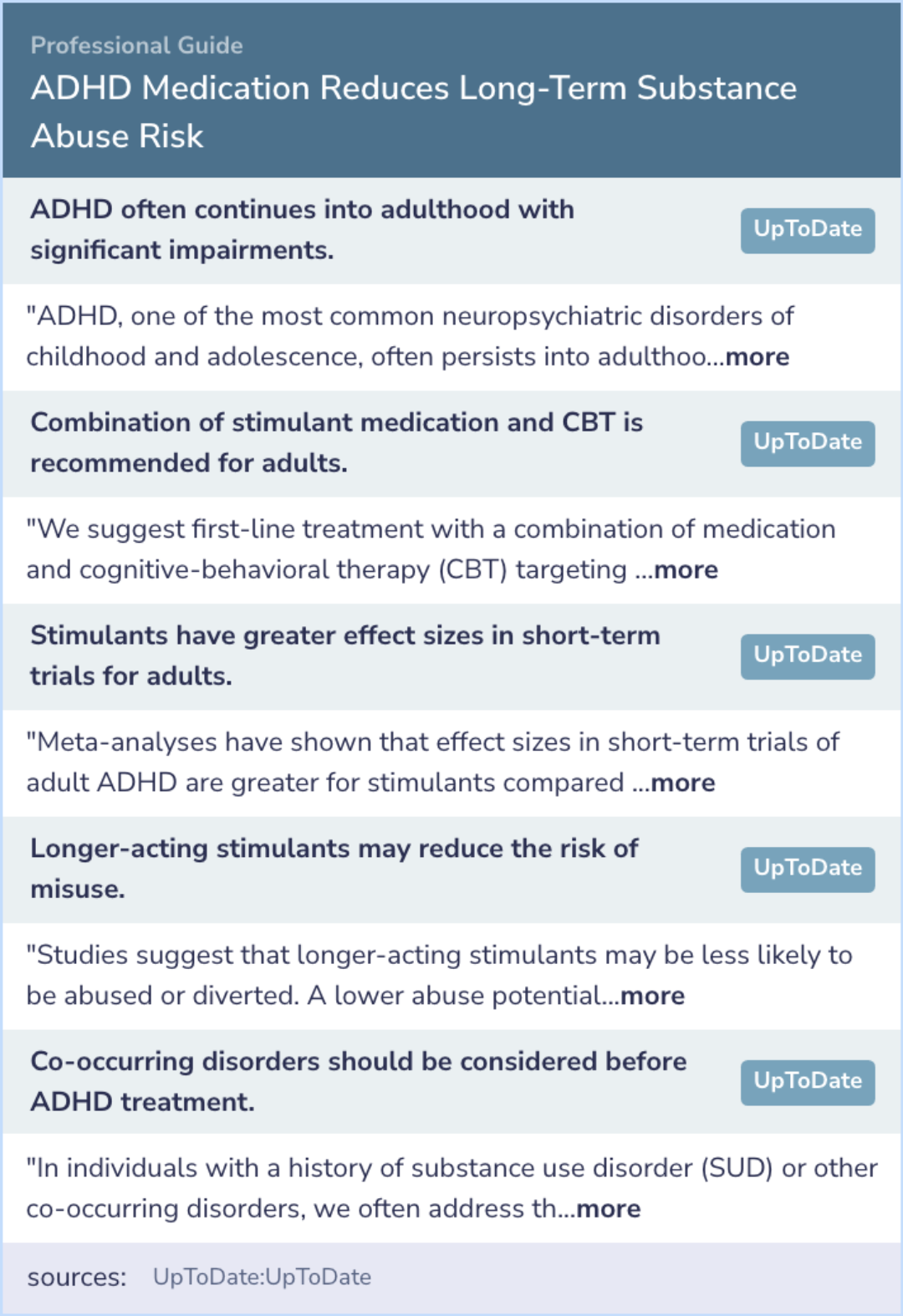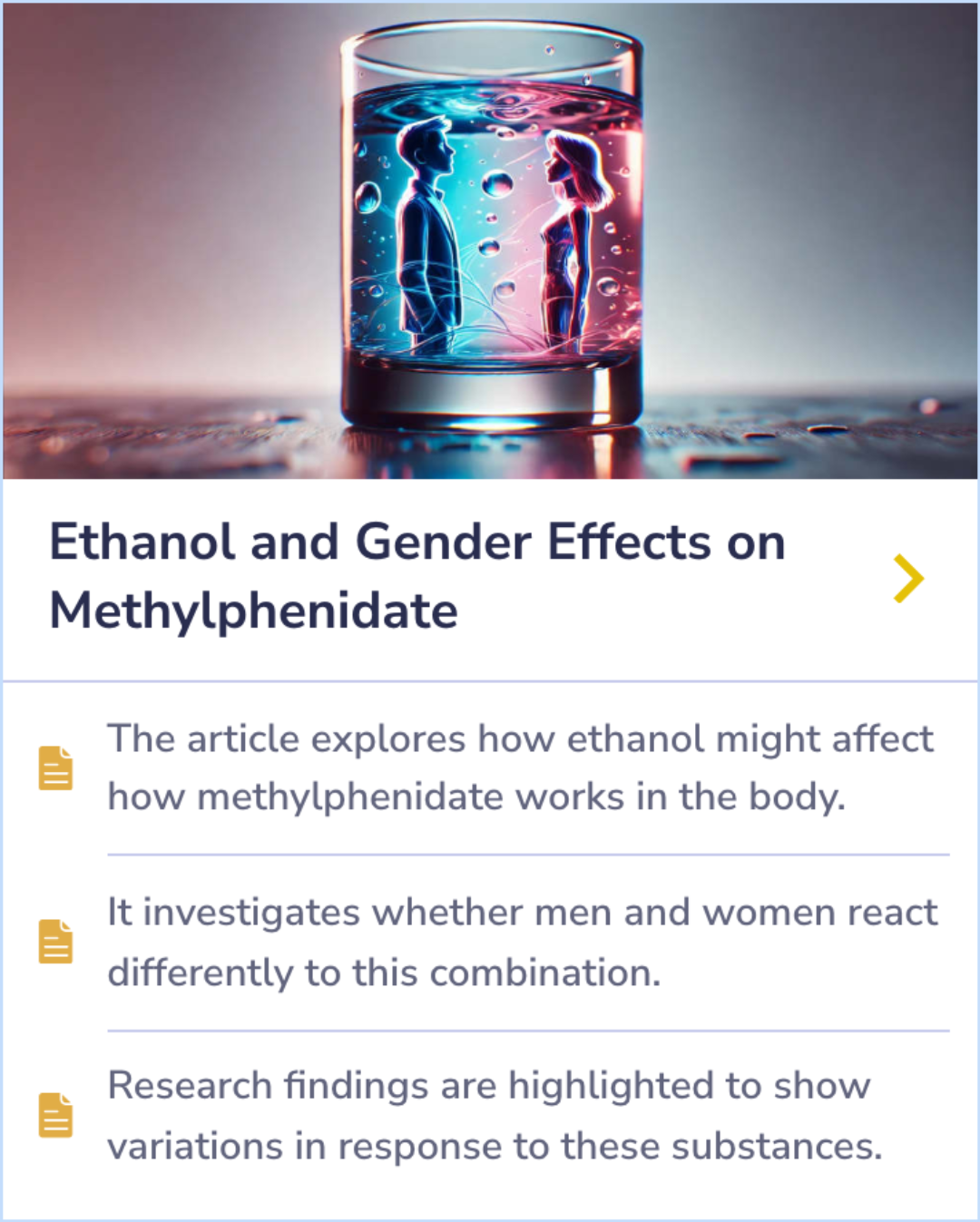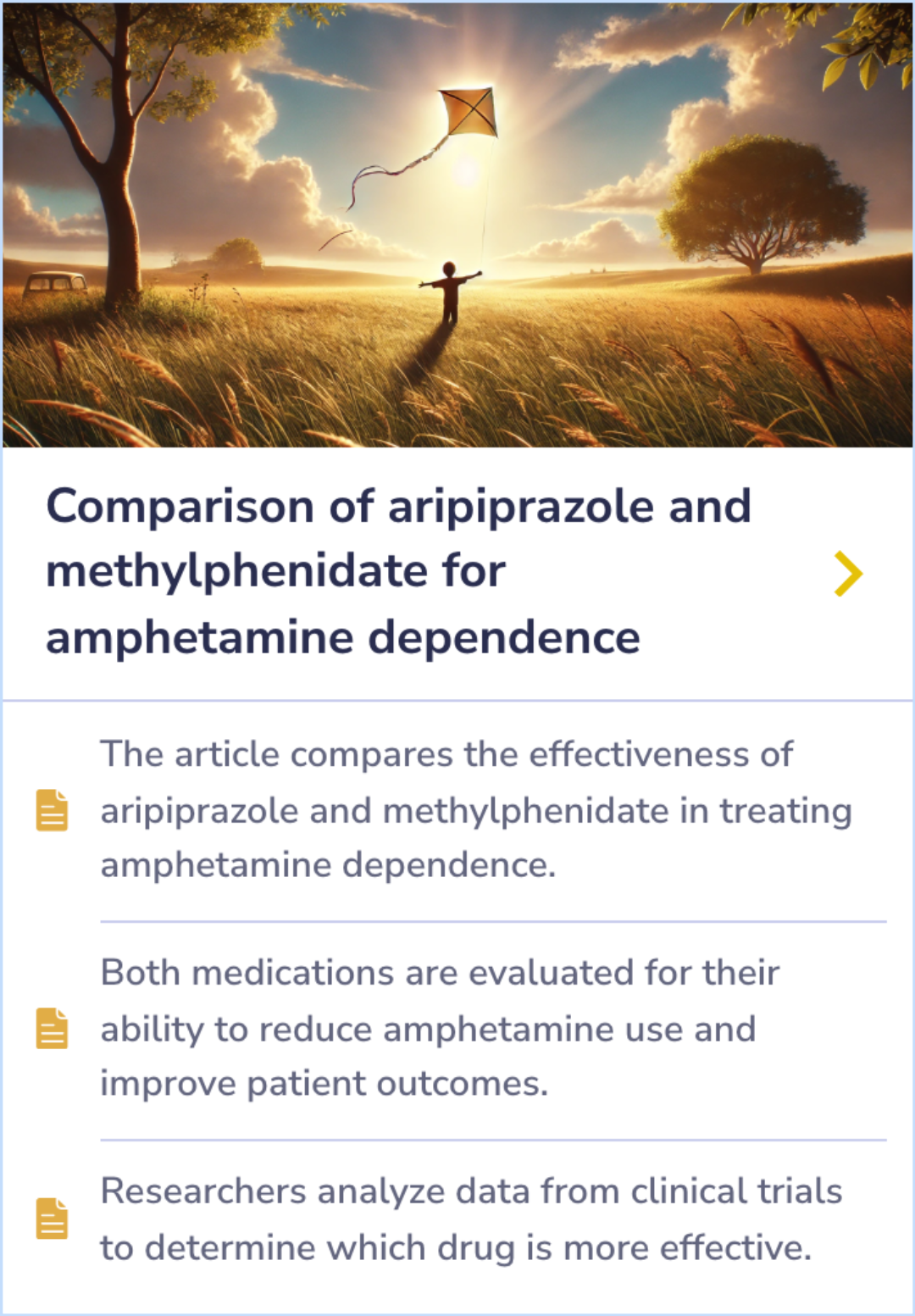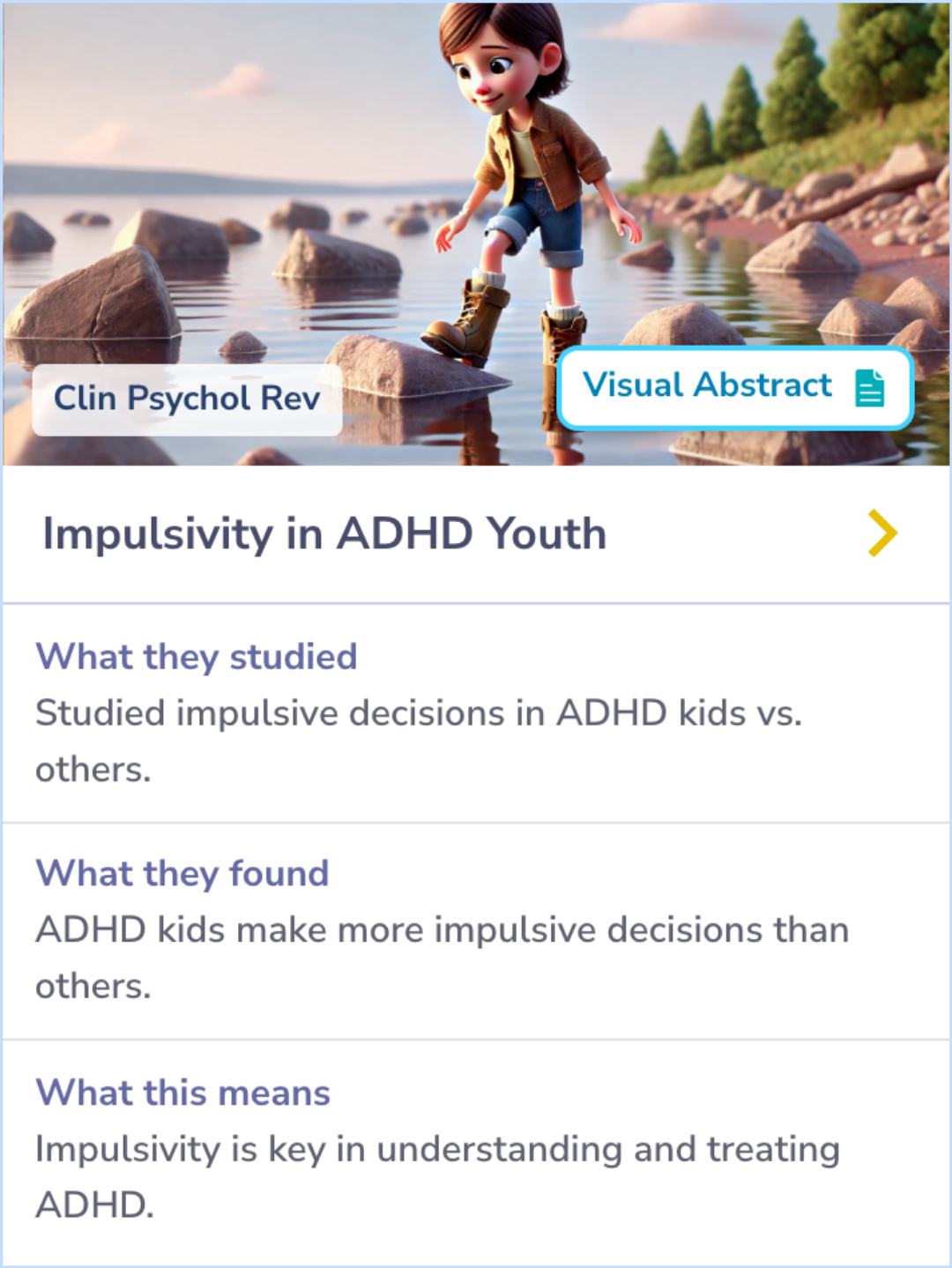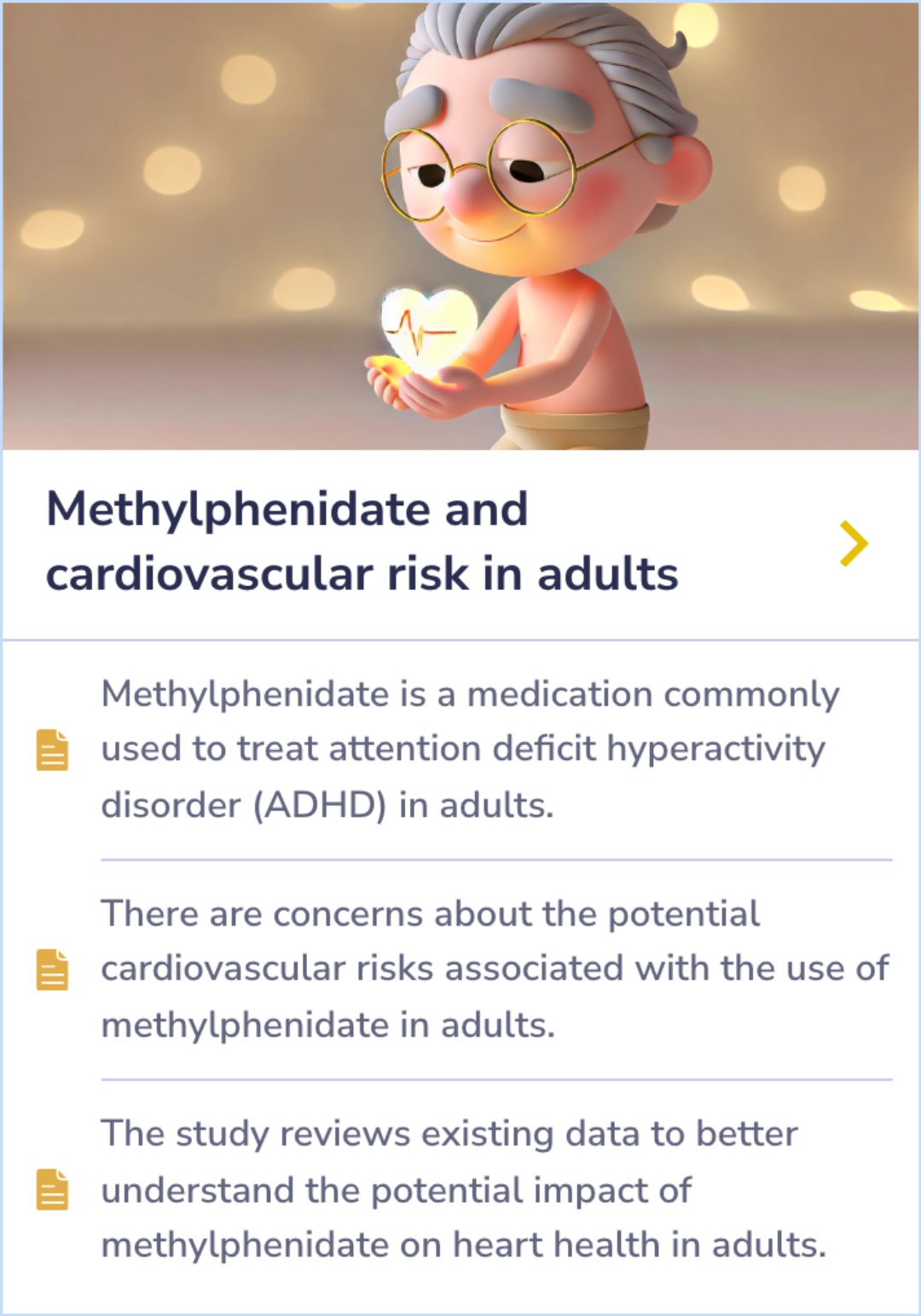Adderall Study Database
Visual Abstract
Stimulant ADHD medication and risk for substance abuse
ADHD medication and substance abuse risk
September 8, 2024
author
Chang Z, Lichtenstein P, Halldner L, D'Onofrio B, Serlachius E, Fazel S, Långström N, Larsson H
journal
J Child Psychol Psychiatry
Date Published
2014 Aug
Why link to a visual abstract?
What is a visual abstract?
Original
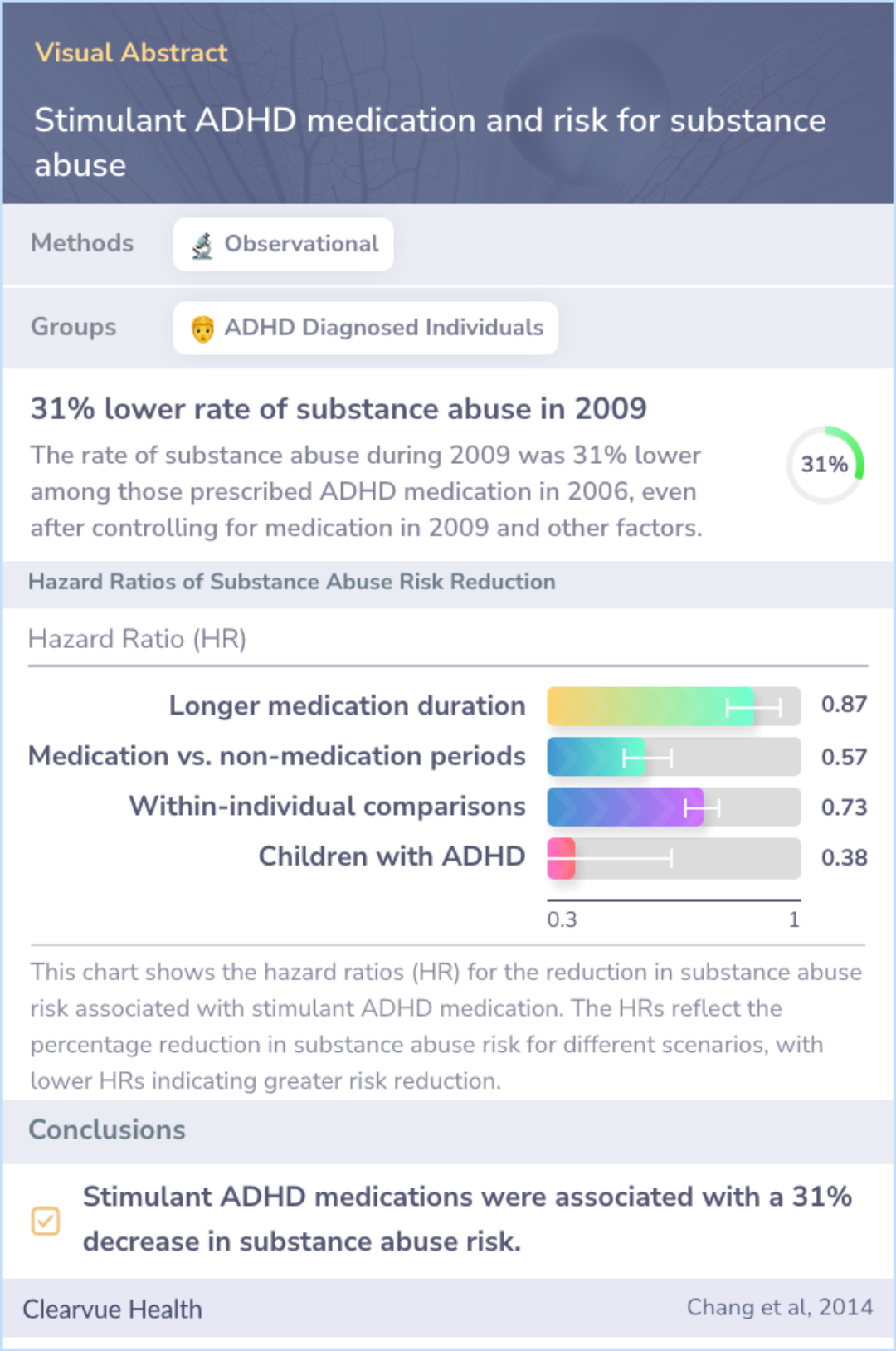
Study Summary
🔬
What They Studied
The researchers studied the link between stimulant ADHD medication use in 2006 and substance abuse outcomes in 2009 among individuals with ADHD.
💡
What They Found
They found that individuals using stimulant ADHD medication had a 31% lower rate of substance abuse in 2009 compared to those not using the medication.
📚
What This Means
These findings suggest that stimulant ADHD medication may have a protective role against substance abuse, aligning with current evidence that emphasizes monitoring for potential misuse despite its benefits.
Study Summary
Study Overview
This study aimed to explore the long-term effects of stimulant ADHD medication on substance abuse. Researchers were particularly interested in understanding whether such treatments might lead to increased risks of addiction. The findings suggest that concerns regarding medication's impact on substance use might be misplaced and that those on ADHD medication may even experience lower rates of substance abuse compared to others.
As families and clinicians consider treatment options, the evidence indicates that the longer someone takes ADHD medication, the less likely they are to struggle with substance abuse issues over time.
As families and clinicians consider treatment options, the evidence indicates that the longer someone takes ADHD medication, the less likely they are to struggle with substance abuse issues over time.
Abstract: background
There are persistent concerns of long-term effects of stimulant ADHD medication on the development of substance abuse.

Concerns Over Medication
"Concerns over the long-term risks for substance abuse following ADHD medication probably have been overstated."
Effect on Substance Abuse
"We found no indication of increased risks of substance abuse among individuals prescribed stimulant ADHD medication; if anything, the data suggested a long-term protective effect on substance abuse."
Need for Evidence
"More evidence is critical for decisions about treatment among individuals with ADHD, their families, and clinicians."
Study Summary
Methods
Researchers utilized Swedish national records to analyze the data of individuals born between 1960 and 1998 who were diagnosed with ADHD. This includes 26,249 men and 12,504 women. The study assessed whether those who took stimulant ADHD medication in 2006 developed substance abuse issues by 2009.
Substance abuse was tracked by looking at substance-related deaths, crimes, or medical visits. This approach provides a broad overview of potential substance abuse issues in the population studied.
Substance abuse was tracked by looking at substance-related deaths, crimes, or medical visits. This approach provides a broad overview of potential substance abuse issues in the population studied.
Abstract: methods
Using Swedish national registers, we studied all individuals born 1960–1998 and diagnosed with ADHD (26,249 men and 12,504 women). We investigated the association between stimulant ADHD medication in 2006 and substance abuse during 2009. Substance ab...more

Study Summary
Results
The data indicates that taking ADHD medication did not raise the risk of substance abuse. In fact, rates of substance abuse in 2009 were 31% lower among those who took the medication in 2006. This reduction held even when accounting for various factors such as continuing medication in 2009.
Furthermore, individuals on longer-term medication use saw even lower risks. Similar reductions in risk were observed in children, suggesting a potential protective effect across different age groups.
Furthermore, individuals on longer-term medication use saw even lower risks. Similar reductions in risk were observed in children, suggesting a potential protective effect across different age groups.
Abstract: results
ADHD medication was not associated with increased rate of substance abuse. Actually, the rate during 2009 was 31% lower among those prescribed ADHD medication in 2006, even after controlling for medication in 2009 and other covariates (hazard ratio: ...more

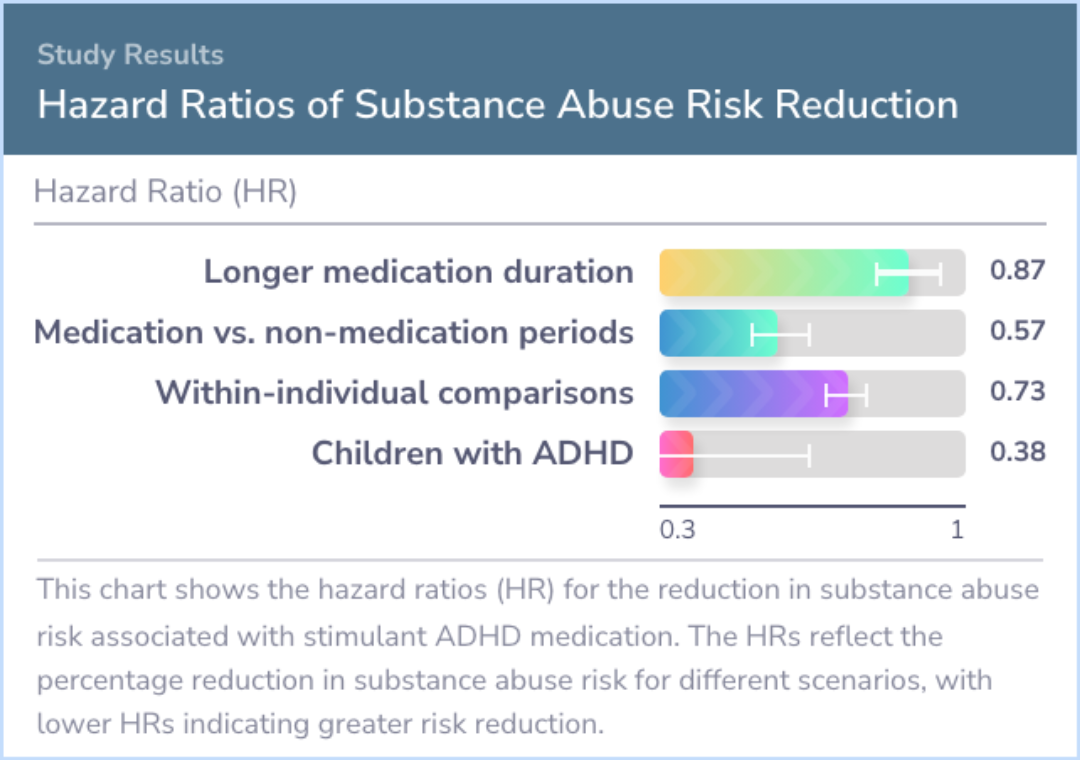
Study Summary
Conclusions
The study concluded that stimulant ADHD medication is not associated with increased substance abuse risk. If anything, it may offer a protective effect against future substance misuse. This finding challenges the idea that these medications are a gateway to substance abuse.
However, healthcare providers should still monitor for potential misuse and diversion of these medications among patients, remaining vigilant despite the positive indications from this study.
However, healthcare providers should still monitor for potential misuse and diversion of these medications among patients, remaining vigilant despite the positive indications from this study.
Abstract: conclusions
We found no indication of increased risks of substance abuse among individuals prescribed stimulant ADHD medication; if anything, the data suggested a long-term protective effect on substance abuse. Although stimulant ADHD medication does not seem to...more
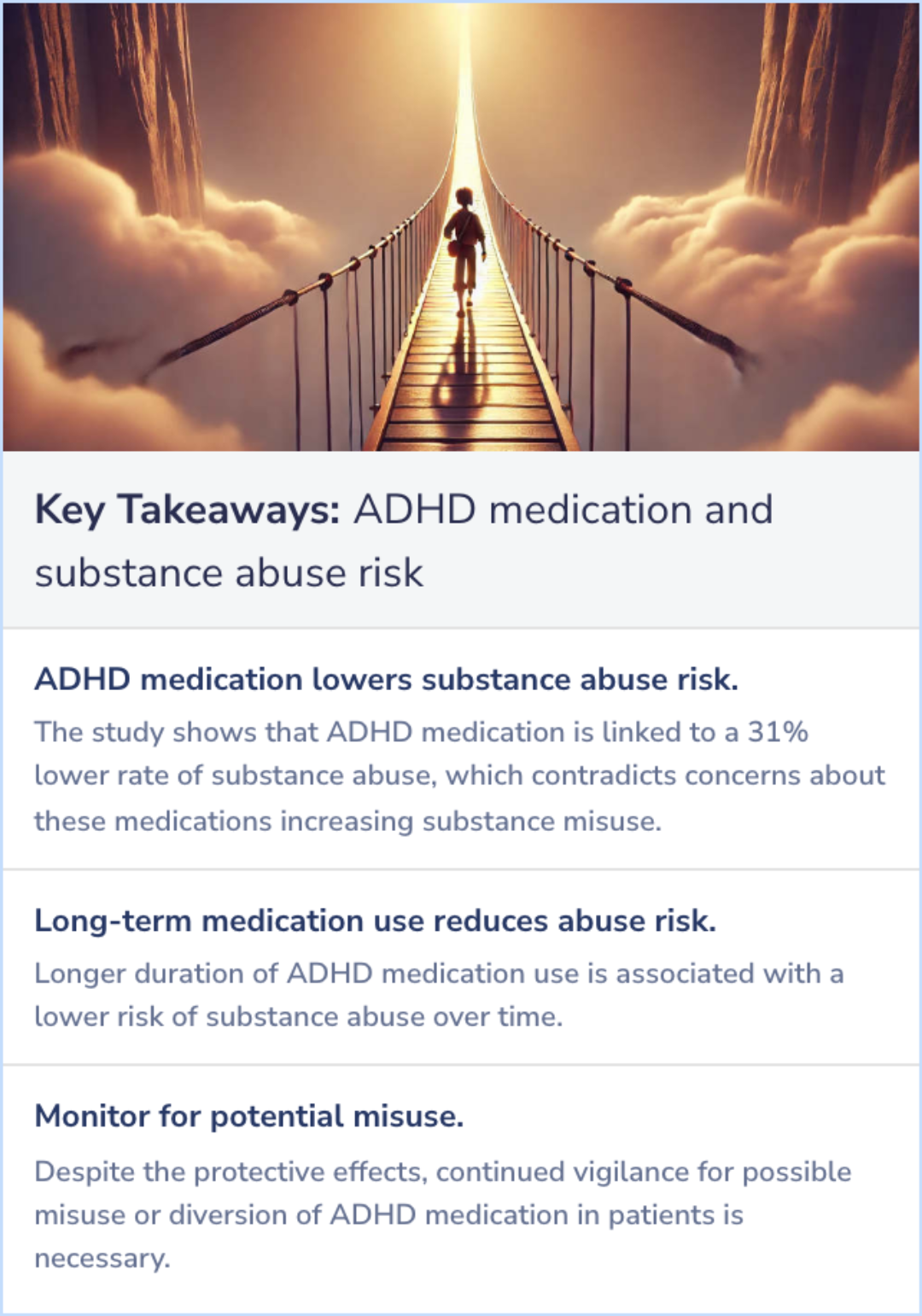
Background Information
Patient Guide
🧠
Methylphenidate Usage
Methylphenidate treats ADHD by increasing norepinephrine and dopamine, offering neuroprotection.
💊
Stimulant ADHD Medication Forms
ADHD medications available in immediate, extended, and sustained-release forms to fit patient needs.
🚨
Potential Misuse Monitoring
Schedule II drugs like methylphenidate require monitoring for signs of abuse and dependence.
📏
Long-term Effects on Growth
Stimulant use in children linked to reduced growth, requiring ongoing monitoring of physical development.
⚠️
Adderall Contraindications
Adderall use is contraindicated in heart disease or drug misuse cases due to significant risks.
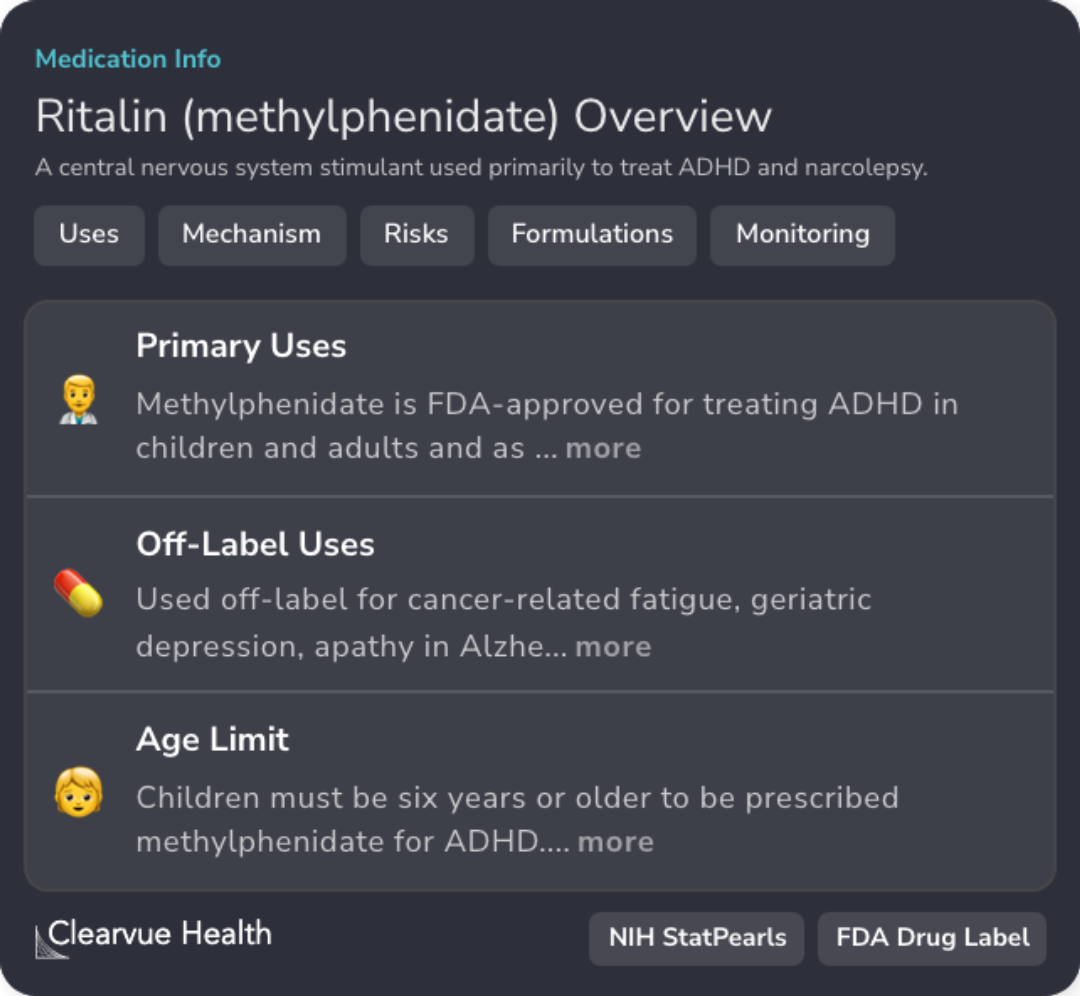
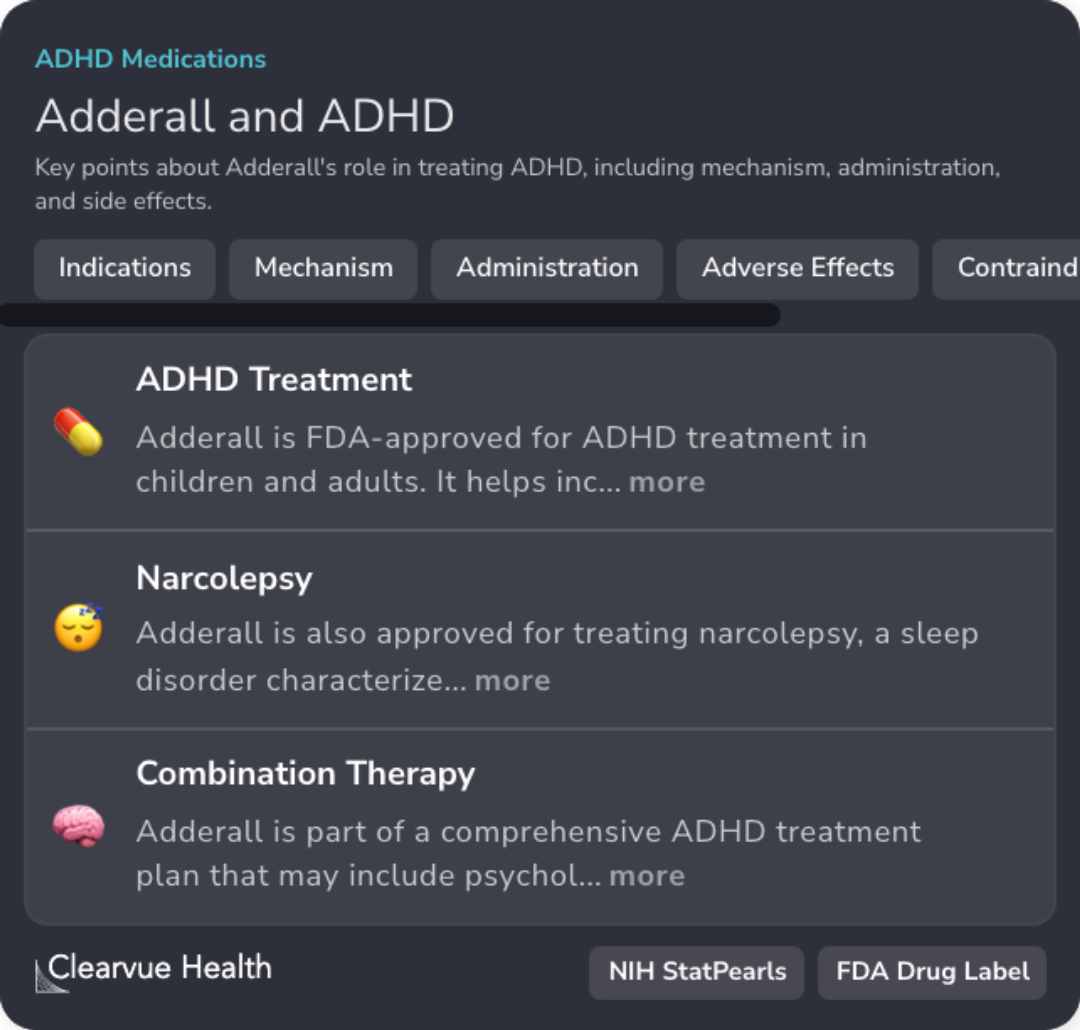
Professional Guide
Expert Opinion: ADHD Medication Reduces Long-Term Substance Abuse Risk
The findings align with existing evidence that stimulant ADHD medications do not escalate the risk of substance abuse.
A combination of cognitive-behavioral therapy and medication is advocated as a primary treatment, tackling executive dysfunction in adults.
Clinicians should conduct thorough evaluations for substance use symptoms prior to prescribing stimulant medication to adolescents, underscoring the need for vigilance.
Furthermore, research notes the reduced potential for misuse with longer-acting stimulants, a valuable consideration in treatment planning.
A combination of cognitive-behavioral therapy and medication is advocated as a primary treatment, tackling executive dysfunction in adults.
Clinicians should conduct thorough evaluations for substance use symptoms prior to prescribing stimulant medication to adolescents, underscoring the need for vigilance.
Furthermore, research notes the reduced potential for misuse with longer-acting stimulants, a valuable consideration in treatment planning.
Evidence Summary
Ethanol's Influence on Methylphenidate: Gender-Specific Reactions
When ethanol interacts with methylphenidate, it might change how this medication works in the body. Research explores if reactions differ between men and women, highlighting distinct response patterns to this combination.
Men and women may experience different reactions to methylphenidate when ethanol is also present, offering insight into varied effects. The study focuses on these gender-specific differences and how they might unfold.
Men and women may experience different reactions to methylphenidate when ethanol is also present, offering insight into varied effects. The study focuses on these gender-specific differences and how they might unfold.
Evidence Summary
Comparing Aripiprazole and Methylphenidate for Amphetamine Dependence
The article explores how aripiprazole and methylphenidate fare in treating amphetamine dependence. It scrutinizes clinical trial data to assess which medication is more effective in curbing amphetamine use and enhancing patient outcomes. The study presents a head-to-head comparison of both drugs, evaluating their impact on reducing amphetamine consumption and overall treatment effectiveness.
Evidence Summary
Impulsivity in ADHD: Acting on Impulse
Impulsive behavior is a hallmark of ADHD, manifesting in two main types: acting quickly without thinking and choosing immediate rewards over larger, delayed ones. Research analyzed data from over four thousand children, revealing that those with ADHD show a medium level effect of impulsive decision-making compared to their peers.
The study found consistent impulsivity patterns across various tasks, regardless of gender or diagnostic methods, underscoring the multifaceted nature of impulsivity.
The study found consistent impulsivity patterns across various tasks, regardless of gender or diagnostic methods, underscoring the multifaceted nature of impulsivity.
Evidence Summary
Assessing Methylphenidate's Impact on Heart Health in Adults
Methylphenidate, commonly used to treat ADHD in adults, raises concerns about its potential impact on heart health. The article delves into research exploring whether this medication poses cardiovascular risks for adult users.
By examining existing data, the study aims to reveal how methylphenidate might affect the heart health of those who depend on it for managing ADHD, providing a clearer picture of its effects, distinct from substance abuse discussions.
By examining existing data, the study aims to reveal how methylphenidate might affect the heart health of those who depend on it for managing ADHD, providing a clearer picture of its effects, distinct from substance abuse discussions.
